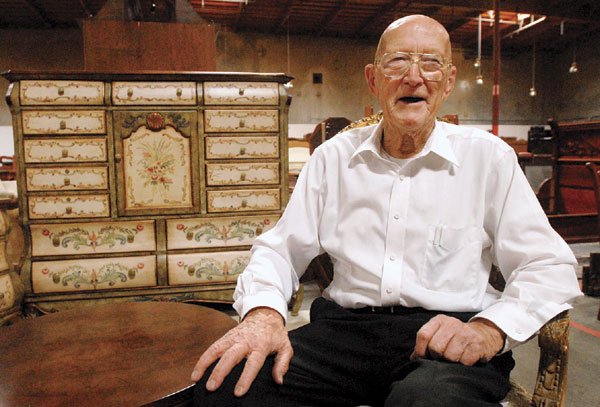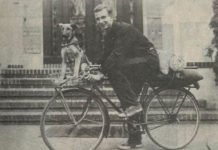Seven thousand miles and a world away, the young Marine handled
the shovel like the Montana farmhand he had once been. It was
August 1942 and Bill Ganson was digging a foxhole on the islet of
Gavutu, a mere pebble in the Solomon Island chain.
Gilroy – Seven thousand miles and a world away, the young Marine handled the shovel like the Montana farmhand he had once been. It was August 1942 and Bill Ganson was digging a foxhole on the islet of Gavutu, a mere pebble in the Solomon Island chain. His shovel struck something unexpected. He dug a little more and pulled up a human head belonging to a fallen Japanese soldier. Clearly, this was not home.
The world was at war and it had swept the 18-year-old to this very spot where he worked in anticipation of another shelling from Japanese planes. Only five months prior Ganson had seen the ocean for the first time in his life and then, at boot camp, they taught him to storm a beach under enemy fire. Now 83-years-old, Ganson remembers the experience acutely.
“It hits on the stomach but you realize that there is not a thing you can do about it and it’s done and you have to move on,” he said.
Memories that some choose to forget and that others can’t help but remember resurfaced with Tuesday’s 65th anniversary of the Battle of Guadalcanal, which came to be known as a turning point in the Pacific campaign of World War II.
Today, Ganson runs Hampton Court Antiques in Gilroy which keeps him busy enough so that he doesn’t dwell on his military past. He said he made no effort to stay in contact with other veterans nor did he keep his uniform. Over the years, he has tried to focus on the lighter wartime anecdotes, attempting to dismiss memories of combat from his mind.
“You don’t want to do that,” Ganson said. “You don’t even want to remember.”
Ganson and 60,000 Allied forces fighting for six months in the Guadalcanal campaign turned the tide, putting Japan’s forces on the defensive for the first time. They successfully forced the enemy to drain much of its resources – 30,000 Japanese died there and 1,000 were captured – as Japan tried to regain control of the base.
Because many WWII veterans are elderly today, it is easy to forget that they were barely adults when they fought. The Japanese attacks on Pearl Harbor galvanized many Americans into volunteering their services. Ganson said he caught “the war fever” and enlisted Feb, 6 1942, an act has never regretted.
Almost immediately, he left eastern Montana where his world revolved around high school, cattle farms and grain harvests. Four months of boot camp in San Diego turned him into a soldier and then his platoon shipped out June 30, just two days after his 18th birthday.
When they first landed on Gavutu Aug. 8, Ganson’s platoon was ordered to immediately dig foxholes in preparation for Japanese air attacks. When the bombs started pouring from the planes overhead nearly all the men survived. The leader of another nearby platoon had greatly erred by giving orders to clear the area of debris first and dig second. Fifty-four soldiers lost their lives to that decision.
Being in an exotic setting, there were extraordinary sights to behold as well. The first time servicemen crossed the Equator, they received a card declaring them a member of the “Ancient Order of the Deep.” It’s a very serious distinction going back hundreds of years to the English Navy, and Ganson is proud of it: 65 years later, he still carries in his wallet the tattered card adorned with Neptune’s spear.
There were 7,099 casualties among the Allied forces that fought in the Battle of Guadalcanal. Certainly, getting killed wasn’t difficult. Ganson recalls one serviceman who decided on his own to take potshots at the Japanese, until his solitary shots were returned by a flurry of bullets that killed him.
Staying alive was one thing but to survive took an ability to adapt. The incessant bombing at night on the islands kept everyone awake and on edge, but not Ganson.
“I got to the point where people couldn’t understand me,” Ganson said. “They used to say ‘Bill, how can you sleep?’ I knew (the bombing) wasn’t going to end so I trained myself.”
One night, he dug a foxhole right next to the barbed wire between the Allied forces’ side and the Japanese side and fell fast asleep in it. The following morning, he heard people call out to him, thinking he had died: that night had been the worse shelling Guadalcanal ever saw–and he slept right through.
Wartime calls for constant adaptation. When your platoon is left behind on Gavutu, an island roughly the size of a city block, you do all you can.
When the three days’ dry food rations you were left with run out you survive by eating rice left behind by the enemy, like Ganson did. When worms show up in your meal, you deal with it and try your best to pick them out.
“The first day you can’t handle it, the second day you had to go for it,” he said.















